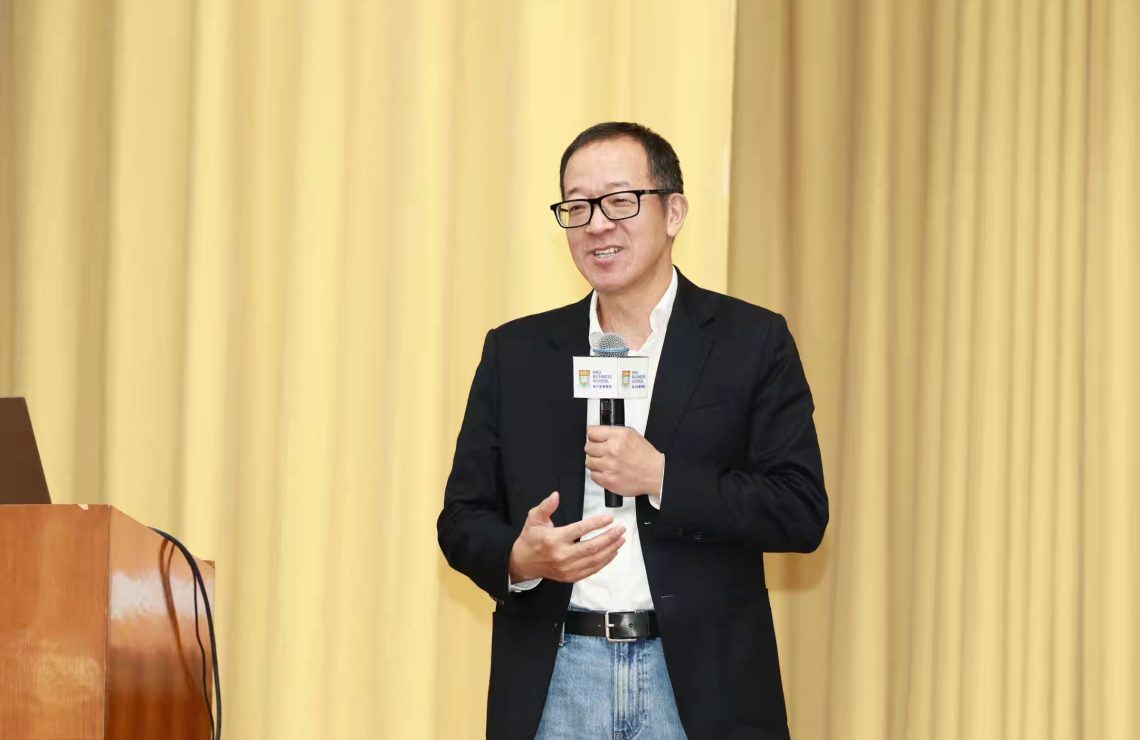The Uninhibited Accountant: Dr. Derrald STICE
The craftsman of knowledge
From Medicine, to Marketing, to Economics, and eventually settling down with Accounting, the uninhibited soul of Dr. Stice has prevented him to be satiated by routine work in the private sector, but to explore the further regions of knowledge and to become the herald of innovation. Years of exploring the vast ocean of business disciplines, has Dr, Stice reached the bottom of its marina trench. He then realized that accounting is the foundation of the modern financial market. It is what keeps companies to be ethical, and what encourages investors to have faith in the market. While mastering the accounting skill of data analysis would greatly facilitate one to further advancing their expertise in finance, understanding the inseparable bond between accounting and ethics could even guide one to the path of earning righteous and sustainable income. Always interested in producing general knowledge that could encompass the world, Dr. Stice has decided to dedicate his life on crafting jewels of business knowledge through tempering the rough stone of accounting.
Although private institutions also have research teams, Dr. Stice is not satisfied with focusing on narrow research topics within limited time. He loves to think and he thinks big. He aims to create knowledge that is applicable to the world. Dr. Stice views the collaborations with the private sector as working holidays as an academic, as a chance to put research findings into practice and observe how they operate in real life. After acquiring new knowledge, he prefers to return to the academia to further his research.
“You can’t do a research in a hedge fund or an investment bank for years! They will give you several hours to make a decision, or several weeks, or months to do a project. That’s all. That is all the time they can give you. The academia on the other hand is different. HKU for example, as long as your research is top-notched, you can have all the time in the world.”
The quintessence of knowledge creation
While many believes that the skills required to get good grades in undergraduate courses are different from the skills in research, Dr. Stice believes that only students who study to survive undergraduate courses would selectively work hard on exams and forgo all the knowledge after the semester ends. However, for students that are genuinely interested in learning, they will go extra mile to understand knowledge from multiple perspectives and discuss their findings with their teachers. These brainstorming activities could prepare an undergraduate student very well for PhD. However, Dr. Stice believes that students have to be more creative in their postgraduate studies as they are tasked to develop and explore ideas never been thought of in the history of human kind.
Other than the basics of ‘being passionate’, to enjoy the academic culture is also a crucial factor to survive academia. The academic culture refers to the endless reading of articles, exchanging of ideas and debating with other scholars. Scholars read what others think, develop their own views, and debate with other scholars on the same issue. Then, they return to their office with a refreshed mind and repeat the process again. After being intellectually stimulated for many years, a scholar may be able to melt down all these ingredients into a delicious stew. If you enjoy thinking, then the academia will be your pot of gold in the rainbow’s end. Since knowledge exchange is a crucial part in the academic culture, the more diverse the background of scholars, the more comprehensive and novel the knowledge produced. As HKU is one of the most internationalized academy in the world, Dr. Stice feels he has found his second home.
But on the dark side of the moon, failure and stress lurk. Publishing an article is very difficult. Top journals would usually have a rejection rate over 90%. It would be a huge deal if a professor ever managed to produce even one publication in a top journal throughout their career. As success is hard, Dr. Stice recommends novice scholars to effectively manage their expectations. On one hand, scholars have to be persistent and determined. You must have faith in your research and constantly believe that you are on the right path. By adjusting your view in such way, every morning you wake up, you would have the motivation to run the gauntlet, again.
On the other hand, one must not take career achievements as their only source of happiness. To Dr. Stice, happiness through workplace achievements are temporary but happiness from family and friends are perpetual. Therefore, it is important to take a break from research once in a while in order to stay mentally and physically healthy. Develop some hobbies could greatly alleviate your stress. Dr. Stice himself for example, engages in a regime of weightlifting and cardio exercises.
The pursue of round numbers
During the interview, Dr. Stice has shared with us his decade-long research work on why are humans fixated on rounded numbers. For example, when reading the financial statements, investors would always prefer to 100 billion instead of 99.5 billion, even though such amount is insignificant in the financial market. But in spite of the irrationality of worshiping rounded figures, companies who achieved them in their financial reports do attract more media coverage, more attention from institutional shareholders, and more analysts to follow.
Unfortunately, the blind pursuit of the rounded figure also induces negative influences. Staff will eventually burn out and companies that have achieved rounded numbers for several years would eventually experience a slower growth in the long term. The market will then lost confidence on the firm’s expansion capabilities, making it increasingly difficult for the firm to solicit new sources of finance.
These conclusions are drawn based on analyzing all the listed companies that have ever existed since the birth of stock market. Dr. Stice has already developed a model to describe these human behaviors and we believe the research will be very interesting.
AI and the accounting career
Dr. Stice has observed that many accounting students are pessimistic with their future because of the development of AI. However, Dr. Stice posits that, what AI replaced is the duty of book keeping and that is conducive to the industry’s development. As accounting interns are freed from mechanical tasks, they can focus more on honing their skills in data analysis.
Dr. Stice believes that the value of accountants lies on their ability to interpret the financial statements and fathom follow-up strategies. Therefore, Dr. Stice believes that it is unnecessary for accounting students to develop a second major in computer science. After all, one does not need to have two majors to excel in life. The second major for students should be reserved for disciplines they are truly interested in. Selecting a major you are uninterested in is excruciating. Your performance is likely to be bad and all your time spent will be rewarded with barren harvest.
Another thing Dr. Stice wants students to bear in mind is that taking CPA does not mean that you have to be with accounting for better, for worse, for richer, for poorer, in sickness and in health. Accounting is the stepping stone in the business world. It could offer you the pathway to multiple industries. For example, as employees of the Big4 accounting firms have a lot of opportunities to analyse the financial records of different prestigious companies, it is therefore very common for Big4 accountants to develop their second career in their clients’ company.
The fundamentals of accounting
For students who are interested in developing a career in accounting, Dr. Stice stresses the importance of understanding accounting principles.
With regards to the principles, there are two schools of thought. Some believes that accounting numbers are facts. They come out from the accounting system and they are absolute. But some believes that accounting numbers are fabricated by manager to help them to get more bonus or to get a promotion.
Neither of them are correct, as accounting principles are executed flexibly in real life. People wants accounting principles to be flexible in order to leave room for mangers to exercise their judgement, and reflect the most accurate economic reality to the market. However, according to the agency theory, because of information asymmetry between mangers and shareholders, managers would always attempt to cheat more than they deserve. Therefore, the auditors of Big4 shoulders great responsibilities to ensure that the financial market is operating in an ethical and trust worthy manner. By striking a balance between the interests of shareholders and managers, auditors ensure that information in the market are credible enough to maintain customer confidence and incentivise investments.
Therefore, Dr. Stice is very active in the crusade of raising corporate awareness on the importance of business ethics and accounting. While he has been consulting and training personnel from countless prestigious financial institutions, his quest is far from over.
Way forward
Teaching in HKU for some time, Dr. Stice observes that students are not only intelligent but also possessing great leadership potential. Since no one knows all, no one will always be on the steering position. Therefore, a good leader is a good team player who could flexibly swap positions between leading and following. Dr. Stice also observes that students have good communication skills during negotiations and division of labour. He is confident that they will be great leaders in the future.
Other than teaching, Dr. Stice also greatly enjoys his research. Dr. Stice is greatly influenced and aspired by the Faculty’s ambition to become the best business school in Asia and even the world. He is excited about the challenges and opportunities ahead.







